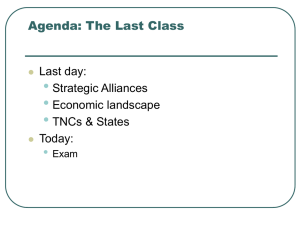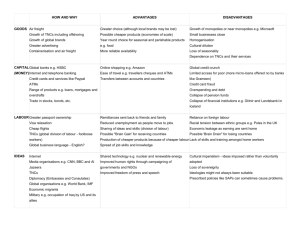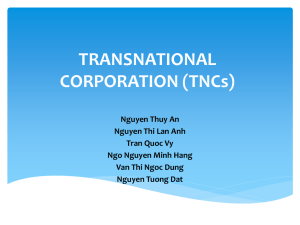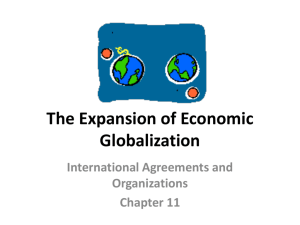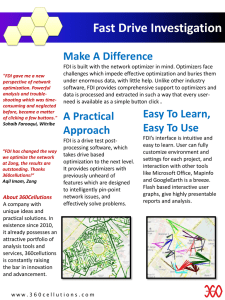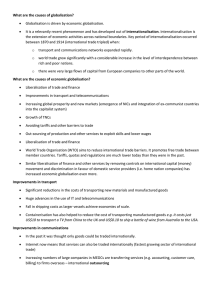TD United Nations Conference on Trade and Development United Nations
advertisement
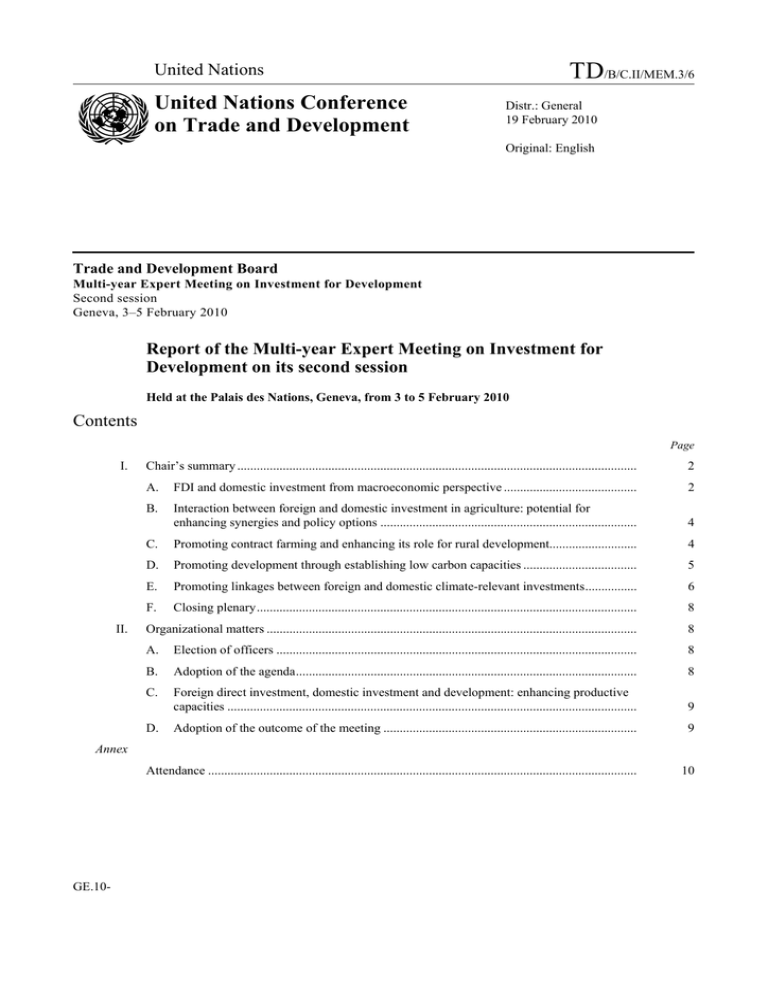
TD/B/C.II/MEM.3/6 United Nations United Nations Conference on Trade and Development Distr.: General 19 February 2010 Original: English Trade and Development Board Multi-year Expert Meeting on Investment for Development Second session Geneva, 3–5 February 2010 Report of the Multi-year Expert Meeting on Investment for Development on its second session Held at the Palais des Nations, Geneva, from 3 to 5 February 2010 Contents Page I. II. Chair’s summary ........................................................................................................................... 2 A. FDI and domestic investment from macroeconomic perspective ......................................... 2 B. Interaction between foreign and domestic investment in agriculture: potential for enhancing synergies and policy options ............................................................................... 4 C. Promoting contract farming and enhancing its role for rural development........................... 4 D. Promoting development through establishing low carbon capacities ................................... 5 E. Promoting linkages between foreign and domestic climate-relevant investments................ 6 F. Closing plenary..................................................................................................................... 8 Organizational matters .................................................................................................................. 8 A. Election of officers ............................................................................................................... 8 B. Adoption of the agenda......................................................................................................... 8 C. Foreign direct investment, domestic investment and development: enhancing productive capacities .............................................................................................................................. 9 Adoption of the outcome of the meeting .............................................................................. 9 Attendance .................................................................................................................................... 10 D. Annex GE.10- TD/B/C.II/MEM.3/6 I. Chair’s summary 1. The opening session of the second Multi-year Expert Meeting on Investment for Development: “Foreign direct investment and domestic investment and development: enhancing productive capacities” discussed key elements of synergies between domestic and foreign direct investment (FDI) from a development perspective. In his opening remarks, the Secretary-General of UNCTAD pointed out that positive impacts of FDI are contingent on a number of conditions and those inflows of foreign capital may not always result in positive development outcomes. However, since domestic investment levels are low, particularly in least developed countries, FDI can contribute to the capital stock and introduce new technologies, including management know-how, which could benefit countries’ long-term and strategic development objectives. 2. He also stressed that the interaction between domestic and foreign investment and the enhancement of potential positive impacts can be observed in many areas such as agriculture and climate change. Although the domestic private sector remains the principle source of investment in the agricultural sector, FDI can make a strong contribution through technology transfer, marketing opportunities and links to global value chains. With regard to climate change, as over the course of the next few decades investment needs for climate change mitigation and adaptation will be colossal, close interaction between foreign and domestic investors is crucial. In addition, the critical question is how to incentivize domestic and foreign private investors to develop or spread the necessary technologies or expertise. A. FDI and domestic investment from a macroeconomic perspective 3. The Director of the Division on Investment and Enterprise highlighted that FDI may substitute, complement or even strengthen the formation of capital by domestically-owned firms. Some experts maintained that differences in the effects of FDI on domestic investment among countries and regions suggest that national development strategies and investment policies – including linkages between foreign affiliates and domestic firms – should be coordinated to ensure the maximization of synergies between FDI and domestic investment. Other experts stressed that history shows that over time, markets allocate capital and resources more efficiently than governments. 4. Some experts were of the opinion that an overarching challenge for many developing countries is attracting FDI rather than alleviating the crowding out of domestic firms. As many developing nations do not have fully developed domestic capital markets or extensive commercial banking, policies would be needed to improve capital account balances by boosting domestic savings. The importance of foreign strategic investors’ involvement in the privatization of state-owned companies in transition economies was mentioned as an effective way to transform these economies. 5. FDI can be beneficial to the development process and to creating linkages with the local economy. Policymakers need to nurture local capabilities, abstain from erecting barriers to investments and promote the use of linkage programmes (without forcing transnational corporations (TNCs) to link up with local investors). Countries need to improve their investment climates by removing regulatory barriers, promoting transparency, ensuring national treatment for all investors and improving the ease of starting, operating and disposing of businesses, as well as by establishing and maintaining a functioning and impartial judiciary. These and other steps to improve the investment climate benefit both domestic and foreign investors. In addition it is important to encourage corporate social responsibility and to capitalize on the core competencies of TNCs in areas such as supply chain management. 2 TD/B/C.II/MEM.3/6 6. It was noted that host countries can enter a virtuous cycle of using FDI to build up local capabilities, which can later serve as a factor attracting future FDI. Experts gave some examples of industrial policies in some countries that had served to develop local suppliers who later grew to become global players. On the other hand, there is an inherent tension between open investment principles and industrial policy. Policymakers need to operate in a complex “ecosystem”, taking into consideration the role and interaction of stakeholders from the private sector, academia, financial institutions and research centres. In addition, an increasing number of developing countries are becoming simultaneously home and host economies of large FDI flows; therefore their efforts towards improving the investment climate should take into account the development implications of both types of flows. 7. The role of small and medium-sized enterprises (SMEs) in building local capacities was stressed. Some experts suggested proactive linkage policies using trade incentives and the attraction of efficiency-seeking FDI as important tools to enhance the development of local SMEs. Another suggestion was made to attract foreign SMEs as they are potential investors and also fill in the “missing middle” in many developing countries where they invest. 8. The perceived roles of FDI and local investment and their relationship within the framework of the development process are being reconsidered in light of the financial crisis. Therefore, policies need to be clearly targeted and context specific. Some experts highlighted that the financial and economic crisis has largely served to reinforce the drive of developing and transition economies towards improving their investment climates. These economies were more likely to introduce policy measures more favourable to foreign investors than their developed country peers. It was suggested that there is a need to design industrial policies and strategies that are consistent with open investment principles, in consultation with all stakeholders, to develop local suppliers through education and skills programmes and target specific FDI. 9. Some experts explained that in many developing countries FDI tends to be concentrated in one or two industries and does not have the expected development impact in terms of job creation. In Africa, for example, FDI is largely concentrated in extraction industries that are generally capital intensive and do not create as many jobs as investments in other sectors, such as manufacturing. A few countries are notable exceptions to this trend and offer a valuable model for others in the region. It was suggested that policies that stimulate growth and diversification, exports, export processing zones and better infrastructure could be considered. 10. As the economic crisis brought into evidence the role of the state in regulating economic activity and fighting the economic downturn, the question of whether public investment is capable of playing a countercyclical role in developing countries was raised. There are two important points that must be considered: fiscal space and shelf-ready projects. While some developing countries were indeed able to engage in countercyclical public investment during the crisis, the number of countries that have sufficient fiscal space to do so is quite small. Additionally, only shelf-ready projects can ensure that countercyclical public investments are efficient. The role of public-private partnerships (PPP) in leveraging the capabilities was stressed. In well-designed PPPs, TNCs can contribute to the efficient delivery of large-scale public investments and to meeting local development needs through the transfer of complex technologies and expertise to local stakeholders. 3 TD/B/C.II/MEM.3/6 B. Interaction between foreign and domestic investment in agriculture: potential for enhancing synergies and policy options 11. The expansion of agricultural production is crucial for fighting hunger and alleviating poverty. Therefore, there is a strong and urgent need to invest more in agriculture in developing countries. Both domestic and foreign investment can contribute. Experts explored the potential for the creation and enhancement of synergies between the two, and discussed policy options and examples in this regard. 12. The importance of interaction between foreign and domestic investment in agriculture and the ways to enhance such interaction were highlighted by the cases of Cambodia and Ghana. An expert stressed the need to eliminate various constraints, such as low productivity, land titling, limited access to credit and inadequate rural infrastructure. For example, the policy of the Cambodian Government focuses on investment-easing measures and FDI promotion, thereby underlining the importance of private sector participation in agriculture as a driving force in poverty alleviation and economic development. Specific measures include, for instance, zero tariffs on importing agricultural materials, tax holidays and the promotion of contract farming. The implementation of these measures has contributed to a substantial increase in agricultural investment in Cambodia. 13. In the case of Ghana, the relevance of tackling low access to credit and input markets and low technological supply in developing countries was addressed. The functioning of contract farming is affected by several factors, including contracting and contract management, the status of infrastructure in rural areas, the marginalization of food production, tensions with regard to land and the fundamental rights of farmers. Some experts underlined the importance of enhancing these effects by promoting a policy and regulatory framework and introducing legislative reforms, including transparencyenhancing measures, to reduce tensions around land. The crucial role of individual farmers in ensuring food safety and agricultural development was also pointed out, including the role of the donor community. 14. Experts also discussed both the positive effects and the concerns associated with FDI in agriculture. FDI can and has contributed significantly to developing countries’ food production capacities and food security efforts and is a vital complement to donor nations’ agricultural development assistance strategies. Concerns raised about investments in agriculture included reduced access to water and land for domestic farmers, the destabilizing impact on society and the possible loss of jobs in the agricultural sector due to efficiency gains. The problems related to land ownership, access to land and “land grabbing” were highlighted and some possible solutions to address these problems were also discussed, including one in which the landowner is involved as a stakeholder in the contract between foreign investors and farmers. The significance of research and development enhancement in developing countries and the problem of research and development bias were stressed by some experts. 15. Several experts highlighted reasons for the low amount of FDI in agriculture, which was partly due to subsidies and land ownership restrictions including land accessibility. The importance of TNCs in agricultural development was stressed and one expert suggested the need to introduce principles of responsible international investment in agriculture. C. Promoting contract farming and enhancing its role for rural development 16. Experts recognized that TNCs could participate in agricultural production not only through FDI, but also via non-equity modes of entry such as contract farming arrangements. 4 TD/B/C.II/MEM.3/6 Contract farming can be defined as a contractual arrangement between producers and buyers for the production and supply of agricultural produce. The essence is a commitment of the producer to provide a certain agricultural commodity at a certain time and price, and in the quantity and quality required by the buyer. Such farming arrangements involving TNCs are widespread, covering over 110 developing and transition economies, spanning a broad range of commodities and, in some cases, accounting for a high share of output. FDI entails a more complicated process involving the acquisition or leasing of lands, while contract farming avoids land acquisition or leasing and represents a more promising way for TNCs to participate in agricultural production. The World Investment Report 2009 indicated that contract farming is widely used in many countries. 17. Experts suggested some specific measures to promote contract farming arrangements and to make them beneficial to local farmers, including in fostering agricultural and rural development. Some experts emphasized that laws preventing unfair contracts can protect farmers and risk mitigation should be part of contracts. The enforcement of contracts is important and there is much room for improvement in this regard in many host developing countries. Disputes can be avoided by clarifying important issues in the contract in the first place. Building trust and a good relationship between the parties involved is crucial to avoid conflicts. Model agreements, an arbitration body and a mediation forum may also be helpful. With appropriate policies, host countries can derive greater benefits while minimizing risks. 18. Some problems associated with contract farming exist. For instance, TNCs may approach large producers and possibly avoid smallholders because of high transaction costs. Low prices are always a problem that contract farming can help, but not solve. The underlying issue is how to strategize agricultural policies to increase food production and the role TNCs can play in achieving this goal. 19. Experts stressed that contractual relationships will only be sustainable if partners perceive that they are better off by engaging in them, and contract farming will fail if parties do not develop mutual trust and reciprocal dependency. Key elements of an enabling environment for contract farming include: general contract laws; land tenure laws; contract enforcement mechanisms; competition regulations; regulations on associations; grades and standards; and finance and risk mitigation mechanisms. Critical success factors are the minimization of contractual hold-ups and the need to build capacity among parties to the contract. Establishing associations is helpful for farmers, but there is no uniform solution. In addition, it can be helpful to include non-governmental organizations as a third party. D. Promoting development by establishing low carbon capacities 20. The experts noted that climate change-induced investments, both domestic and foreign, are relatively new and that the specific policy frameworks associated with them are still being developed by countries. While there will be enormous challenges in meeting the colossal investment needed over the next few decades, the climate change issue also represents an opportunity for developing countries not only to attract new investments, but also to enter new and growing international markets. Even small countries may benefit in the context of regional markets. 21. Some experts noted that the Clean Development Mechanism has so far been the largest climate-related international source of private financing for low carbon technologies in developing countries. However, the scale of funds generated is insufficient to match the needs for mitigation investments in developing countries. Moreover, the Clean Development Mechanism has design shortcomings and operational/administrative limits; its future is indeed subject to some uncertainties in the context of the debates on future international climate policy. In addition to FDI, public finance initiatives such as PPPs 5 TD/B/C.II/MEM.3/6 (which may involve TNCs’ participation) were suggested as alternative sources of funding and other resources for climate change mitigation. 22. In addition to these international mechanisms, developing countries can – as some are – move ahead with the creation of markets for low carbon technologies, especially new areas and industries such as renewable energies. Examples of such measures that drive from both domestic investment, but in many cases also from foreign investment, include renewable portfolio standards and feed-in tariffs. Motivations for setting up such policies are often a mix of climate change considerations, energy security and concerns about resource scarcity. Experts highlighted the importance of enabling regulatory and legal frameworks, including the protection of intellectual property rights, in attracting investment and driving innovation. 23. An expert highlighted a successful country in the development of a new low carbon industrialization path. A wide range of policy instruments have been adopted in promoting the “cyclic and low carbon economy” and fighting climate change in this and a few other countries. Experience shows that market creation can be complemented by other policy measures, including industrial policy, which is a critical component in catalysing the needed investments to meet the country’s energy intensity reduction goals. On the other hand, wide adoption of national industrial policies in this sector could lead to the misallocation of resources and stunt the global effort to reduce carbon emissions. FDI related to low carbon technologies, especially in renewable energy, is on the increase in this country and others. 24. Using the experience of Asian countries, one expert suggested that increasing the capabilities of local companies is crucial to creating opportunities to crowd in domestic investment and build capacities, drawing on opportunities created by TNCs through FDI and other non-equity forms of participation. The information and communication technology industry was used as an example of how this can be done successfully. A similar approach in enhancing domestic capacities could also be used in terms of low carbon technologies – e.g. through astute linkages programmes and the training of suppliers. Concrete examples of establishing effective linkages between foreign companies and TNCs, for instance in the power industry in Karnataka, India, were presented. 25. Increasingly global markets are requiring that companies reduce the carbon footprint of their operations and products, and international standards are important in creating linkages between local companies and TNCs. In this regard, government policies should encourage better local understanding of standards and their significance, subsidize compliance fees and adopt public procurement policies that require local suppliers to meet international standards and open procurement to international competition. Overall, the importance of the global value chain in which TNCs are the pre-eminent players was emphasized – and the fact that in order to develop their productive capacities, host country firms must pay full heed to entering these chains (e.g. as suppliers to TNCs) and comply with emerging standards. E. Promoting linkages between foreign and domestic climate-relevant investments 26. Experts discussed best practices in the promotion of linkages between foreign and domestic climate-relevant investments in developing countries. It was highlighted that there is an important shift in recent TNC strategies throughout different sectors, including TNC strategies moving from traditional FDI towards non-equity forms of involvement such as contracting, outsourcing and strategic alliances. 6 TD/B/C.II/MEM.3/6 27. In addition, TNCs are increasingly using the market for outsourcing certain operations instead of internalizing them to increase efficiency. They also use offshoring for this purpose. These developments in TNC strategies could bring both benefits and costs to developing countries. They raise opportunities for developing country producers to participate in value chains by becoming suppliers. However, TNCs might also find it easier to enter and leave a market. Furthermore, benefits may not always be equally shared with domestic players due to stronger negotiating power and control of information by TNCs. Delegates further pointed out that TNCs could establish a monopolistic position by crowding out local players and reducing the international competitiveness of the host country industry. 28. There are two key elements that determine the success of linkages. These are the existence of domestic entrepreneurship and domestic absorptive capacity, including the development of relevant legal frameworks and domestic management capacity. 29. A number of measures to promote linkages between foreign and local companies were taken that could also play a role with respect to climate-relevant investments. They included the following: (a) Governments should monitor possible crowding out effects and support local companies to compete; (b) Governments need to step in when the market is abused or there is a strong concentration of market power in the hands of TNCs. Beyond competition policy, competition can, for instance, be increased by opening up the domestic market to a regional level; (c) Domestic enterprises can seek cooperation with TNCs through subcontracting, joint ventures or PPP arrangements or to compete by seeking niche markets, including using their potential bargaining power or seek their own path to enter global markets; (d) Governments could provide support to domestic actors in upgrading and improving the competitiveness of local companies so that they can participate more effectively in global value chains and as partners of TNCs. For instance, setting up a competitiveness programme for SMEs, building local capabilities and developing entrepreneurship will enable SMEs to work with TNCs; (e) Governments need to be active in supporting local companies in PPP arrangements as they are less experienced in such endeavours than TNCs. The support does not necessarily entail the provision of finance but more of information and increasing local companies’ abilities to analyse conditions of contracts. In some cases, however, the government’s financial support can limit a country’s efforts to build local capacity; (f) Governments should improve the countries’ general business climates and thereby decrease the cost of doing business for both local and international companies. 30. Some experts expressed that there are different ways for domestic players including cooperatives to participate in value chains controlled by TNCs. Their lack of governance is sometimes perceived as a barrier for engaging with TNCs, but this is usually not a dealbreaker. The critical issue would be whether local companies and cooperatives have the ability to effectively manage the supply chain. In general, TNCs are tolerant of different forms of governance, including cooperatives. 31. On specific areas of climate-relevant investments, one expert stressed that there is no climate change value chain as such. Instead, the focus is more on energy use and efficiency at very different stages of the value chain. However, some industries and activities are more relevant than others. For instance, corporate “climate change” strategies often relate to the 7 TD/B/C.II/MEM.3/6 substitution of fossil fuels by renewable energy sources, reducing energy use by increased efficiency, technology and research alliance, and giving standards of emission reporting. Furthermore, in the energy sector, consulting engineers play a critical role, e.g. to establish a local solar sector. From a commercial perspective, as consumers are becoming increasingly sensitive to clean or ethical products, some TNCs are moving towards branding their products. On the side of government policies, there are examples of countries that are moving in the direction of promoting low carbon initiatives in various value chains by setting up special economic zones that focus predominantly on low carbon industries. However, this is a new area and further research is needed to identify the exact role of TNCs in both the development of a low carbon economy and their interaction with domestic players in achieving this goal. F. Closing plenary 32. During the closing plenary, the Chair opened the floor for comments on the first draft of the Chair’s summary (sessions 1–4) that was made available to the delegates. One expert indicated that the reference to the role of contract farming could be more balanced. Contract farming could be part of the solution but should also be recognized as contributing to problems of market power. Another expert pointed to the fact that it is more a problem of land access than land ownership. Another also stressed the importance of principles on international investment in agriculture, covering contract farming. 33. The Vice-Chair-cum-Rapporteur will be in charge of finalizing the report on the meeting. Some important findings from the meeting highlighted by the Director of the Division on Investment and Enterprise include the recent change from host to home country of some developing countries, the importance of setting up principles of sustainable investment in agriculture and the need for further research on the role of TNCs related to climate change, including policy options and capacity-building for developing countries. He also reminded the delegates of the second World Investment Forum in China later in 2010. II. Organizational matters A. Election of officers 34. At its opening plenary meeting, the multi-year expert meeting elected the following officers: B. Chair: Mr. Kenichi Suganuma (Japan) Vice-Chair-cum-Rapporteur: Sr. Arturo Rivera Magaña (Mexico) Adoption of the agenda 35. At its opening plenary meeting, the multi-year expert meeting adopted the provisional agenda for the session (contained in TD/B/C.II/MEM.3/4). The agenda was thus as follows: 8 TD/B/C.II/MEM.3/6 1. Election of officers 2. Adoption of the agenda 3. Foreign direct investment, domestic investment and development: enhancing productive capacities 4. Adoption of the outcome of the meeting C. Foreign direct investment, domestic investment and development: enhancing productive capacities 36. At its closing plenary meeting, on Friday, 5 February 2010, the multi-year expert meeting agreed that the Chair should summarize the discussions (see chap. I). D. Adoption of the outcome of the meeting 37. Also at its closing plenary meeting, the multi-year expert meeting authorized the Vice-Chair-cum-Rapporteur, under the authority of the Chair, to finalize the report after the conclusion of the meeting. 9 TD/B/C.II/MEM.3/6 Annex Attendance∗ 1. Representatives of the following States members attended the expert meeting: Albania Algeria Angola Argentina Azerbaijan Barbados Belarus Benin Botswana Brazil Bulgaria Cambodia Chad China Côte d’Ivoire Czech Republic Djibouti Dominican Republic Egypt Finland France Germany Ghana Greece Guatemala Holy See Indonesia Iran (Islamic Republic of) Iraq Italy Japan Jordan 2. Kazakhstan Kenya Kuwait Lesotho Mexico Mongolia Morocco Myanmar Namibia Nigeria Pakistan Peru Philippines Poland Russian Federation Saudi Arabia Singapore Slovakia South Africa Spain Thailand The former Yugoslav Republic of Macedonia Togo Trinidad and Tobago Turkey Uganda United States of America Venezuela (Bolivarian Republic of) Viet Nam Yemen Zimbabwe The following observer attended the session: Palestine 3. The following intergovernmental organizations were represented at the session: African, Caribbean and Pacific Group of States African Union Eurasian Development Bank European Union ∗ 10 For the list of participants, see TD/B/C.II/MEM.3/Inf.2. TD/B/C.II/MEM.3/6 4. The following United Nations organizations were represented at the session: Economic Commission for Europe United Nations Environment Programme 5. The following specialized agencies or related organizations were represented at the session: Food and Agriculture Organization of the United Nations World Trade Organization 6. The following non-governmental organizations were represented at the session: General category Ingénieurs du monde International Centre for Trade and Sustainable Development International Institute for Sustainable Development World Association of Former United Nations Interns and Fellows 7. The following panellists were invited to the expert meeting: (Listed in chronological order of intervention) Mr. Dirk Willem TeVelde, Programme Leader, Investment and Growth, Overseas Development Institute Mr. Samson Muradzikwa, Chief Economist, International Division, Development Bank of Southern Africa Mr. Gabor Hunya, Senior Economist, Vienna Institute for International Economic Studies, Austria Mr. Soken Sok, Deputy Director, Department of Investment Project Evaluation and Incentives Council for Development of Cambodia, Government Palace, Cambodia Mr. Kingsley Ofei-Nkansah, Secretary General, Ghana Agricultural Workers Union, Ghana Mr. Tulegen Sarsembekov, Chief Specialist, Technical Assistance Unit, Strategy and Research Department. Eurasian Development Bank, Kazakhstan Ms. Florence Tartanac, Agro-industry Officer, Rural Infrastructure and Agroindustries Division, Food and Agriculture Organization of the United Nations, Rome Mr. Jos Bijman, Professor, University of Wageningen, Netherlands Mr. Oshani Perera, Programme Officer, Climate Change, Energy and Trade, International Institute for Sustainable Development, Switzerland Mr. Chunping Yang, Director and Senior Research Fellow, Institute of Economic System and Management, National Development and Reform Commission, China Ms. Laura Altinger, Economics Affairs Officer, United Nations Economic Commission for Europe Mr. Andrei Metelitsa, Senior Counselor, Ministry of Foreign Affairs, Belarus Mr. Samson Muradzikwa, Chief Economist, International Division, Development Bank of Southern Africa Mr. Matthew Bateson, Managing Director, Energy and Climate Focus Area, World Business Council for Sustainable Development, Switzerland Mr. Peter Buckley, Professor of International Business, University of Leeds Mr. Abdoul Aziz Wane, Directeur, Guichet unique des investissements, Commissariat à la promotion des investissements, Mauritanie 11

